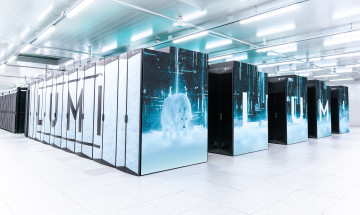Supercomputing with LUMI
This two-day hybrid course serves as an introduction to the LUMI architecture and setup. It will include lessons about the hardware architecture, compiling, using software and running jobs efficiently. After the course you will be able to work effectively on both the CPU (LUMI-C) as well as GPU partition (LUMI-G).
- 02 — 03 May 2024
-
Time9:45 to 16:45
-
LocationSURF Amsterdam & online
This month we are celebrating that the Netherlands has become part of the consortium of the LUMI supercomputer with a course given by the LUMI User Support Team onsite in the Netherlands! You will learn how to work with large supercomputing systems directly from the experts of one of the largest supercomputers in the world, which is now accessible in a direct way for all users in the Netherlands.
Please be aware that this is an introduction to the specifics of LUMI and not a general HPC intro course. It is targeted at current and future users of LUMI and requires some knowledge of HPC concepts such as job schedulers (SLURM), differences between login and compute nodes, and logging in via SSH. If you need a refresher, please review for example the following materials on general HPC (https://carpentries-incubator.github.io/hpc-intro/) or the basic usage of LUMI (https://docs.lumi-supercomputer.eu/firststeps/).
What will you learn in this training?
In this training you will:
• connect to LUMI and transfer data from and to the cluster
• understand LUMI's hardware and effectively compile software on it
• utilize the module system and EasyBuild for software management
• submit and manage jobs with Slurm, including the use of job arrays and GPU/CPU binding
• identify and mitigate I/O bottlenecks in the LUSTRE file system
• create Python environments and run containers on LUMI
For whom?
Anyone who wants to know how to perform very large computing tasks, specifically if you intend to use the LUMI supercomputer in the future.
Prerequisites:
Basic knowledge of the Unix shell and general HPC cluster computing is necessary.
Familiarity with a programming language (C, Fortran, or Python) is highly recommended.
Agenda
Day 1:
09:45 - Course introduction
10:00 - Hardware architecture (40 min)
10:40 - Cray Programming Environment (45 min)
11:25 - Break
11:55 - How to access LUMI (35 min)
12:30 - Lunch break
13:30 - Exercises (30 min)
14:00 - Modules (35 min)
14:35 - Exercises: Exploring the modules (15 min)
14:50 - Break
15:20 - Software (55 min)
16:15 - Exercises (30 min)
16:45 - Wrap-up of the day and free Q&A
Day 2:
9:45 - Short welcome, recap and plan for the day
10:00 - Slurm 1 (75 minutes)
11:15 - Break
11:45 - Slurm 2: Binding (45 minutes)
12:30 - Lunch break
13:30 - Slurm exercises (30 minutes)
14:00 - Using Lustre (30 minutes)
14:30 - Containers on LUMI (60 minutes including demo or exercises)
15:30 - Break
16:00 - LUMI support and documentation (20 minutes)
16:20 - LUMI in The Netherlands (15 minutes)
16:35 - What else do we offer and what did we not cover and how can I learn about it? (10 minutes)
16:45 - Q&A and wrap-up
Cannot participate onsite in Amsterdam?
Don't worry! We are also setting up an online option for participation, so you are also welcome to participate from home (only with potentially limited support for exercises).
